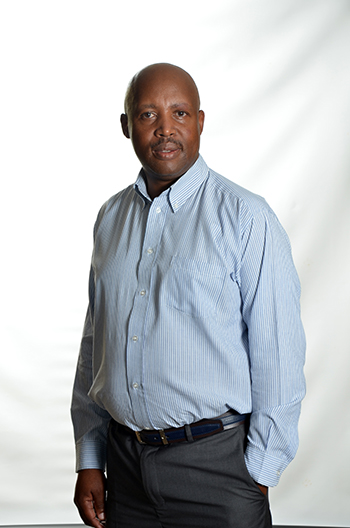Latest News Archive
Please select Category, Year, and then Month to display items
09 November 2018
|
Story Charlene Stanley
|
Photo Charlene Stanley
 Dr Tseliso Ntili, HOD of the Free State Department of Water and Sanitation, warns that pollution caused by mismanagement of municipal water-treatment works puts severe pressure on the province’s water security.
Dr Tseliso Ntili, HOD of the Free State Department of Water and Sanitation, warns that pollution caused by mismanagement of municipal water-treatment works puts severe pressure on the province’s water security.
“Despite our water challenges, Bloemfontein will never become a second Cape Town.” This firm assurance was given by Dr Tseliso Ntili, HOD of the Free State Department of Water and Sanitation, during his presentation at the recent regional seminar of the Faculty of Law’s Environmental Law Association.
The theme of the seminar was Water Quality and Water Security in Bloemfontein and was attended by staff and students from the Faculty of Law and the Faculty of Natural and Agricultural Sciences, as well as relevant role players from private, business, and government sectors.
Not enough water for city’s needs
Water restrictions in some form do seem to remain part of our future landscape though, as Dr Ntsili explained that the city’s current water yield of 218 megalitres per day still fell short of the demand of 259 megalitres per day.
Pollution and mismanagement at municipal level
He pointed out that a big cause for concern was that 75% of the Free State’s waste-water treatment works were dysfunctional. Housekeeping and security at these plants are often severely neglected. Yet, it is difficult for the Department of Water and Sanitation to act against offending municipalities.
“In intra-governmental disputes, the courts must be satisfied that organs of state have taken all reasonable steps to settle contentions – which can be a time-consuming process,” he explained.
Dr Ntsili said that the Caledon River System’s dwindling water levels due to low rainfall and siltation was also a concern, but that plans were underway to supplement the water supply to Bloemfontein via the Gariep Dam by 2026.
However, he warned that poor water management could drastically affect these long-term plans.
“If we can’t manage pollution, the cost will be high. Water security will be challenged, and we will have water shortages – not because of drought, but because of negligence.”
Meet our Council: Mr Rantooa Moji – passionate about the welfare of workers
2017-07-07

Mr Rantooa Moji, member of the UFS Council
Photo: Stephen Collett
Mr Rantooa Moji has recently joined the UFS Council by virtue of being chairperson of the university’s Institutional Forum (IF). The IF’s function is to advise Council in accordance with the Higher Education Act and UFS Statute.
Born and bred in Qwaqwa, Mr Moji is a junior lecturer in Chemistry at the university. He completed his BSc (Hons) in Chemistry at the then UNIN (Qwaqwa), which is now part of the UFS. He also completed an MA (HES) at the University of the Free State.
Fascinated with Chemistry
“I pursued science mainly due to my school background, but I also have a keen interest in the subject. The diverse applications of Chemistry in daily life have always fascinated me and that is why I chose to pursue it,” he says.
During his postgraduate studies at the UFS, Moji was exposed to education and management trends in higher education. He has subsequently become involved with labour relations issues through the personnel union Nehawu. He says he has a passion for the welfare of workers and therefore fulfils a number of roles in the union, including representing members in disciplinary and grievance hearings, being part of the negotiations team, and representing the union on a number of institutional committees, such as the Health Care Committee.
Passion for worker’s welfare
Says Mr Moji: “I feel that my experience as an academic and a union activist puts me in good stead to ensure that the views and aspirations of employees are taken into account in the Council’s deliberations and decision-making.”
Mr Moji is married, with two daughters and one son.